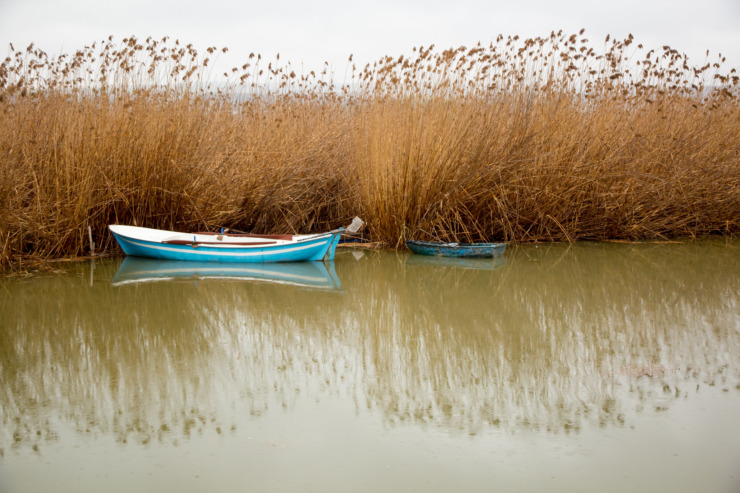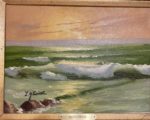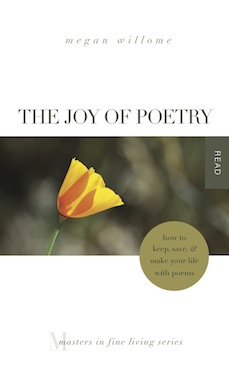Forever after, Lucille Clifton’s “blessing the boats” will be associated with the last thing I took from my dad’s house — a painting titled “Nosotros” by L.Y. Whistler. For my parents, it symbolized the Chilean sea where they first kissed.
blessing the boats
(at St. Mary’s)
may the tide
that is entering even now
the lip of our understanding
carry you out
beyond the face of fear
may you kiss
the wind then turn from it
certain that it will
love your back may you
open your eyes to water
water waving forever
and may you in your innocence
sail through this to that
I can put myself in two places simultaneously: the person in the boat, about to sail away (the one being blessed), and also the person on the shore, about to wave goodbye (the one giving the blessing). The rocks to the right fade into the green waves, which will stop crashing as the boat reaches deeper water, and the water turns to blue, and the blue will be blessed by the sun (rising or setting, the painting doesn’t say).
Lucille Clifton is one of our Take Your Poet to Work icons. Although Clifton’s poetry was recognized in her lifetime — she was nominated twice for the Pulitzer and served as poet laureate of Maryland — I don’t think she was recognized enough. Clifton’s star has only shined brighter since her death in 2010, and I believe it will become brighter still, much like Emily Dickinson’s. I decided to learn one of Clifton’s poems by heart after interviewing poet Ashley M. Jones, who treasures Clifton’s poems so much that she has purposely not yet read every one.
In “blessing the boats,” the words “May you” are a repeated blessing:
may the tide
may you kiss
may you / open
may you in your innocence / sail
The word “may” means many things, from possibility to certainty. In Clifton’s hands the tiny word “may” encompasses every interpretation. Letting go is hard. But somehow it’s easier to release things when we stand at the water’s edge, “the lip of our understanding.”
It was more than a week into learning Clifton’s poem that I realized the ninth line was not “love you back” but “love your back.” As in, I love the part of you that is turned from me.
I love that line, perhaps because I have always loved pictures taken from behind, like the one of me carrying my son to the sea for the first time. It was November, and our family and my parents were at the coast together. The water was neither blue nor green, but a little brown. My son didn’t care for the sand or the waves (still doesn’t), but my parents met on the beaches in Chile, so even dinky ol’ Rockport, Texas, was, for them, a gold-framed memory of love.
For the people implied in this poem, for the sail-er and the stay-er, I wish for them both a peaceful journey upon the “water waving forever.” I wish for them innocence as they “sail through this to that.” And I would like to give them a painting (or at least a photograph) to capture the blessing.
Your Turn
Did you memorize “blessing the boats” this month? Join our By Heart community and share your audio or video using the hashtags #ByHeart and #MemoriesWithFriends and tagging us @tspoetry. We also welcome photos of your handwritten copy of the poem.
By Heart for March
For the next By Heart gathering, March 26, we’ll learn “One Art” by Elizabeth Bishop.
One Art
The art of losing isn’t hard to master;
so many things seem filled with the intent
to be lost that their loss is no disaster.
Lose something every day. Accept the fluster
of lost door keys, the hour badly spent.
The art of losing isn’t hard to master.
Then practice losing farther, losing faster:
places, and names, and where it was you meant
to travel. None of these will bring disaster.
I lost my mother’s watch. And look! my last, or
next-to-last, of three loved houses went.
The art of losing isn’t hard to master.
I lost two cities, lovely ones. And, vaster,
some realms I owned, two rivers, a continent.
I miss them, but it wasn’t a disaster.
—Even losing you (the joking voice, a gesture
I love) I shan’t have lied. It’s evident
the art of losing’s not too hard to master
though it may look like (Write it!) like disaster.
–Elizabeth Bishop
Photo by Omer Unlu, Creative Commons, via Flickr. Post by Megan Willome.
Browse more By Heart
“Megan Willome’s The Joy of Poetry is not a long book, but it took me longer to read than I expected, because I kept stopping to savor poems and passages, to make note of books mentioned, and to compare Willome’s journey into poetry to my own. The book is many things. An unpretentious, funny, and poignant memoir. A defense of poetry, a response to literature that has touched her life, and a manual on how to write poetry. It’s also the story of a daughter who loses her mother to cancer. The author links these things into a narrative much like that of a novel. I loved this book. As soon as I finished, I began reading it again.”
—David Lee Garrison, author of Playing Bach in the D. C. Metro
- Perspective: The Two, The Only: Calvin and Hobbes - December 16, 2022
- Children’s Book Club: A Very Haunted Christmas - December 9, 2022
- By Heart: ‘The night is darkening round me’ by Emily Brontë - December 2, 2022



Bethany R. says
“’love your back.’ As in, I love the part of you that is turned from me.”
Beautiful piece here. Thank you for sharing it with us.
Megan Willome says
Thanks, Bethany! Inreally enjoyed spending February with this poem.
L.L. Barkat says
This is so very tender, Megan.
The waters’ edge is always a balm to me. So I loved this line: “Letting go is hard. But somehow it’s easier to release things when we stand at the water’s edge, “’the lip of our understanding.’”
Megan Willome says
This is why I’ve been to the coast twice since my dad passed away.
Sandra Heska King says
“Tender” is a good word for this piece. I love the thought of kissing the wind, of loving your back, and of sailing through this to that. Such a beautiful poem–and post.
Megan Willome says
And you’re near water, Sandy, which would make learning this poem even nicer.
NELSON OKOTH says
So nice to read through.
Megan Willome says
Thank you.